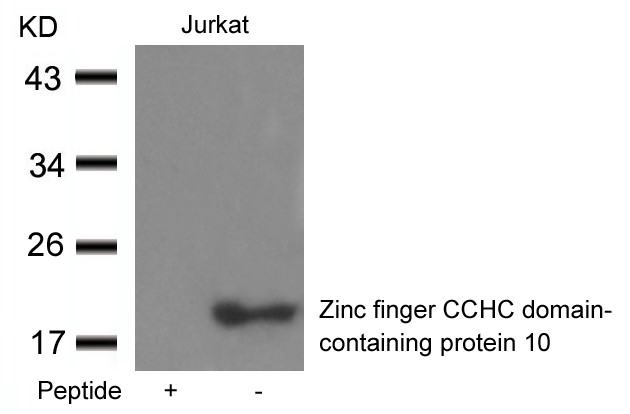
| WB | 1/500 - 1/2000 | Human,Mouse,Rat |
| IF | 咨询技术 | Human,Mouse,Rat |
| IHC | 1/200 - 1/1000 | Human,Mouse,Rat |
| ICC | 技术咨询 | Human,Mouse,Rat |
| FCM | 1/200 - 1/400 | Human,Mouse,Rat |
| Elisa | 1/10000 | Human,Mouse,Rat |
| Aliases | ZCCHC10; FLJ20094; |
| Entrez GeneID | 360524; |
| WB Predicted band size | 20kDa |
| Host/Isotype | Rabbit IgG |
| Antibody Type | Primary antibody |
| Storage | Store at 4°C short term. Aliquot and store at -20°C long term. Avoid freeze/thaw cycles. |
| Species Reactivity | Human |
| Immunogen | Peptide sequence around aa.10~14 (A-R-R-Q-A) derived from Human Zinc finger CCHC domain-containing protein 10. |
| Formulation | Purified antibody in PBS with 0.05% sodium azide. |
+ +
以下是3篇关于Desmin抗体的参考文献及其简要摘要:
---
1. **文献名称**: *"Desmin: a major intermediate filament protein essential for the structural integrity and function of muscle"*
**作者**: Li ZL, et al. (2019)
**摘要**: 该文献综述了Desmin在肌肉细胞中的核心作用,强调其作为中间纤维蛋白对肌纤维结构稳定性和收缩功能的重要性。研究还探讨了Desmin抗体在诊断遗传性肌病(如desminopathy)中的应用,包括通过免疫组化检测肌肉活检中Desmin异常聚集的病理特征。
---
2. **文献名称**: *"Antibody-based profiling of intermediate filaments in human tumors: utility of desmin antibodies in diagnostic pathology"*
**作者**: Smith J, et al. (2015)
**摘要**: 本文分析了Desmin抗体在肿瘤诊断中的特异性表达模式,证实其在平滑肌肉瘤、胃肠道间质瘤等软组织肿瘤中的标记价值。研究发现,Desmin抗体可有效区分肌源性肿瘤与其他间叶源性肿瘤,是病理学中重要的辅助诊断工具。
---
3. **文献名称**: *"Pathogenic desmin mutations impair mitochondrial autophagy and cause aggregate formation in cellular models"*
**作者**: García-García A, et al. (2020)
**摘要**: 该研究通过细胞模型揭示了Desmin基因突变导致线粒体自噬功能障碍的机制,并利用Desmin抗体标记突变蛋白的异常聚集。结果表明,突变Desmin形成的蛋白聚集体与肌细胞退行性病变密切相关,为治疗干预提供了潜在靶点。
---
以上文献涵盖了Desmin的结构功能、诊断应用及疾病机制研究,可通过PubMed或Google Scholar检索全文。
Desmin antibodies are immunological tools widely used in research and diagnostic pathology to detect desmin, a type III intermediate filament protein primarily expressed in muscle cells. Desmin plays a critical structural role in maintaining the integrity of muscle fibers by connecting the cytoskeleton with contractile apparatuses, such as Z-discs in striated muscles and dense bodies in smooth muscles. It is highly abundant in skeletal, cardiac, and smooth muscle tissues, making it a key biomarker for studying muscle-related pathologies.
In research, desmin antibodies are employed to investigate muscle development, regeneration, and diseases like myopathies, cardiomyopathies, or muscular dystrophies. They help identify abnormalities in desmin expression or aggregation, which are hallmarks of conditions such as desmin-related myopathy or certain cardiac disorders. In diagnostic settings, these antibodies aid in distinguishing muscle-derived tumors (e.g., rhabdomyosarcoma) from other neoplasms, as desmin positivity supports a myogenic origin.
Commercially available desmin antibodies are typically monoclonal or polyclonal, validated for techniques like immunohistochemistry (IHC), Western blotting, or immunofluorescence. However, specificity and cross-reactivity can vary between clones, necessitating careful validation. Despite these challenges, desmin antibodies remain indispensable for understanding muscle biology and advancing clinical diagnostics, particularly in characterizing tissue samples with unclear histopathological features. Their utility underscores the importance of intermediate filaments in cellular mechanics and disease mechanisms.
×